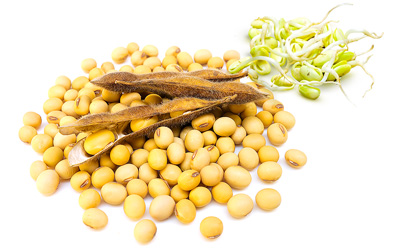In the world of nutrition, legumes are often hailed as foundational staples, celebrated for their rich nutrient profile and versatility in global cuisines. They're not just essential for a balanced diet, but also for their role in ecological sustainability. Despite the many nutritional advantages they offer, legumes are often unappreciated, possibly because most require soaking prior to being cooked. Dive into the world of legumes and discover how these small seeds can make a big difference in your everyday diet!
What Are Legumes?
Legumes are a broad category of vegetables. Botanically, they belong to the Fabaceae family, which are plants characterized by their seeds growing enclosed in pods.
When we talk about legumes in a dietary context, we're referring to the seeds within these pods. They come in various shapes, sizes, and colors, each with its unique flavor and texture.
Legumes are further divided into three main subgroups:
- Oilseed legumes: soybeans and peanuts
- Pulses: Dry beans, lentils, dry peas, and
chickpeas - Fresh legumes: fresh beans and fresh peas
Some experts also include the fourth subgroup, sow crops, which include clovers and alfalfa.
Legumes' Nutritional Profile
Legumes are praised for their high protein content, making them an excellent meat alternative for vegetarians and vegans. Despite their high amounts of protein, not all legumes are considered sources of complete protein, which are those that contain all nine essential amino acids that the body does not produce.
Legumes are also rich in complex carbohydrates (including dietary fiber), vitamins (e.g., B-group vitamins), and minerals (e.g., iron, zinc, potassium, and magnesium). On top of that, they are also naturally low in fat and have a low glycemic index.
Legumes' Health Benefits
Thanks to their nutritional richness, regular consumption of legumes has been associated with several health benefits, such as:1
- Controlling blood sugar levels
- Regulating cholesterol levels
- Managing hypertension
- Increasing satiety
- Helping with weight control
- Promoting gut health
Legumes' Environmental Benefits
Besides growing in pods, legumes have a unique ability to fix nitrogen in the soil, reducing the need for chemical fertilizers. This process enriches the soil, making legumes an essential crop in crop rotation and permaculture practices. Their deep root systems also prevent soil erosion and promote biodiversity.
Legumes' Culinary Versatility
Incorporating legumes into a daily diet could not be easier. They are widely available in the stores throughout the year and can be cooked in a myriad of ways to enrich savory and sweet meals.
They can be used as a base for soups, stews, burgers, and salads. Thanks to their creamy texture, they can be easily turned into nutritious dips and spreads. They can also be ground to replace all-purpose flour.
In addition to savory dishes, many pulses are an excellent addition to desserts. They enrich them with protein and fiber and give them a dense texture, without overpowering them with their flavor.
Some examples of delicious legume-filled recipes include the following:
Breakfast
- Chickpea Salad Sandwich
- Easy Lentil Wraps
- Lentil Bread with Arracacha Flour
- Amaranth Omelette with Green Peas and Beans
Lunch & Dinner Meals
- White Bean Burgers with Kaniwa Flakes
- Eastern European Beet Soup
- Mexican Quinoa Flake-Stuffed Peppers
- Sacha Inchi Falafel Burgers
- Quinoa Flake Chickpea Meatballs
- Turmeric Couscous with Chickpeas and Goldenberries
- Baked Amaranth Green Pea Fritters
Desserts & Snacks (Sweet & Savory)
- Chocolate Hummus
- Vegan Chocolate Chickpea Bark
- Beet Hummus
- Crispy Spiced Chickpeas
- Amaranth Chickpea Brownie
- Roasted Red Pepper Hummus with Sacha Inchi
Legumes are a nutrient-dense, environmentally-friendly, and versatile food group that deserve a prominent place in modern diets. Whether you're looking to boost your protein intake, reduce your environmental impact, or simply enjoy delicious and hearty meals, legumes are a smart and tasty choice. So, next time you're at the grocery store, don't pass by the legume aisle—embrace the variety and let these little wonders enrich your culinary adventures.
Sources
- Harvard T.H. Chan - School of Public Health, Legumes and Pulses, n.d.
- Michigan State University, Legumes: A Powerhouse of Nutrition, 2012
- The Journal of Nutrition, Carbohydrate Replacement of Rice or Potato with Lentils Reduces the Postprandial Glycemic Response in Healthy Adults in an Acute, Randomized, Crossover Trial, 2018
- University of Arizona, What Are Legumes?
- University of Wisconsin, Legumes & Nitrogen Fixation, 2021
Footnotes:
- Clinical Diabetes. (2015). Legumes: Health Benefits and Culinary Approaches to Increase Intake. Retrieved March 15, 2024, from https://www.ncbi.nlm.nih.gov/pmc/articles/PMC4608274/






